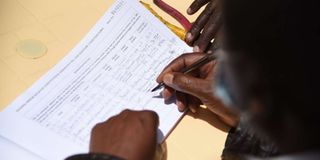BBI: IEBC publishes list for public verification

A resident of Eldoret town, Uasin Gishu County, signs a booklet during the launch of the Building Bridges Initiative signature collection drive on November 28, 2020.
Do you suspect that your name was included in the list of those that back the Building Bridges Initiative (BBI) Bill without your consent?
Well, you have until Monday, January 25 to check the list published online by the Independent Electoral and Boundaries Commission (IEBC) and have them expunge your name as the country gears towards a BBI referendum mid this year.
The commission is required by law to publish the names of those that constitutional amendment promoters—just like the BBI—say back their Bill to allow those whose names have been erroneously included to indicate their objections.
“Anyone who has been captured as a BBI Constitutional Amendment Bill supporter without their consent can report to the commission by sending a duly signed objection letter either scanned and emailed to [email protected] or dropped at the IEBC offices, Anniversary Towers, Nairobi, 7th floor, latest by 5pm on Monday January 25, 2021,” IEBC Chairman Wafula Chebukati said in a statement.
Kenyans can access the list here:
The publishing of the list and the subsequent objection window means the journey to the BBI referendum is inching closer with the IEBC expected to verify whether those that remain after names have been expunged after the objection period, are at least a million registered voters.
For the Bill to move to the next stage—debate and approval by each of the 47 county assemblies—IEBC has to determine that at least one million of the people the BBI team said supported the document are in the commission’s database as registered voters.
The IEBC list published online was after the commission weeded out incomplete records in the list of the 4.4 million names the BBI team sent to the agency to verify.
The list published online are in two folders: one 15,152 pages long, and the other, 5,266 pages long.
With 20,418 pages of people’s data with each page having an average of 65 names, the IEBC has published a total of 1.327 million names.
From the 4.4 million the BBI team presented, the commission has weeded out a staggering three million names from the list.
“The commission undertook data cleaning by removing incomplete records, which includes missing signature, Identification numbers, and names, as well as duplicates and those not in the register of voters,” Mr Chebukati said.
In the Dr Ekuru Aukot-led Punguza Mzigo case, the commission also published online the full list of the 1.4 million the team said supported the initiative and gave Kenyans 21 days to verify that their names were not listed in error if they had not appended their signatures.
After the verification of signatures, the IEBC will submit the Bill to the 47 county assemblies and the regional Houses will have three months within which to consider the Bill.
If more than half (24) pass the Bill, it will be introduced to the Senate and the National Assembly.
Once the President passes his message to the IEBC to hold a referendum on the receipt of the Bill from Parliament, the commission has 90 days within which to hold a referendum.
IEBC had budgeted Sh93 million for the verification, with each of the 60 clerks the commission hired expected to earn Sh1, 200 per day for a maximum of 40 days.
While the IEBC has no set timeline in law within which to complete the verification, the agency had on December 31 set itself a 40-day deadline, which ends on February 9.
Orange Democratic Movement (ODM) leader Raila Odinga wants the process after the IEBC bit to go on as fast as possible.
“After the IEBC has verified signatures, we will go to the county assemblies. And we hope that we can get 24 county assemblies to approve within one week. And thereafter we go to Parliament. From there, we will go to the people of Kenya,” Mr Odinga diligently explained recently.
He went on: “Now, these other people should say their stand. And then the people of Kenya will decide. And whatever they decide, we will accept it. That is how democracy works.”





